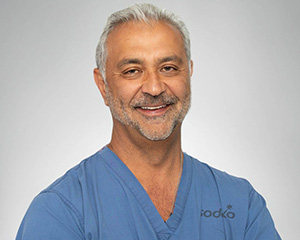Repair any botched breast implant surgery with certified plastic surgeon Dr. Mazaheri
What Are Breast Implants?
Whether they’re for reconstruction after a mastectomy or to enjoy cosmetically: lots of women opt to get breast implants surgically placed into their bust to adjust its size or shape. The most common types of implants are made of either saline or silicone material.
Saline implants contain sterilized saltwater so they’re safely absorbed by your body if ruptured. They give you a consistent shape, firmness, and feel. Silicone implants are filled with silicone gel and are thought to feel more natural, but need to be removed immediately if they begin to leak. Both are available in a range of sizes and textures so you can pick whatever you feel most comfortable with!
Despite the highly-customizable implant selection process, you’ve probably heard about a “botch boob job,” which is when a breast implant procedure goes wrong.
Get Your Personal Consultation
What Are the Natural Causes of “Botched” Breast Surgery?
Botched breast implants or augmentation surgery—otherwise known as a botched boob job—don’t just happen because people naively trust an uncertified plastic surgeon. We’ve highlighted some of the reasons your procedure could’ve gone wrong even if you worked with a credible surgeon in a clean facility.
| Complication | Description |
|---|---|
| 1. Capsular Contracture | Capsular contracture is the most common and difficult-to-predict surgery complication. Here, scar tissue wraps and tightens around the foreign breast implant. This contraction changes the final look and can be discomforting, but it can be alleviated with breast revision surgery. |
| 2. Implant Malposition | When your body is adjusting to the foreign implant, it may heal in a way that pushes around your thin breast skin and tissue. This could cause the implant to shift into the wrong location. Implants can also be moved back into their rightful spot using a tailormade breast revision procedure. |
| 3. High Malposition | A high malposition occurs if the breast pocket is placed too high up the chest, or if the implant positions itself too far up the pocket. This can be brought on by capsular contracture, how the body naturally heals, or an underwire bra is worn during recovery and it squeezes the lower pocket closed. Luckily, it’s just as easy to fix surgically as it is prevalent! |
| 4. Low Malposition | A low implant malposition means that the implant and/or pocket bottoms out (rests too low). This can also happen if you’re lacking strong breast fold attachment to stop an implant from pushing down on your thin breast skin. The heavier the implants, the greater the risk for low malposition. A plastic surgeon can revise bad low-hanging breast implants with surgery. |
| 5. Lateral Malposition | It’s also common for implants to move to the sides of your chest if the pockets aren’t made well, your chest wall curves, or your thin breast skin and tissue aren’t strong enough to stabilize them. The chances of lateral malpositioning increase if you have had a capsular contraction or if you sleep on your stomach during recovery. This would require revision surgery to open back up the pocket ends at the center of your chest. |
| 6. Symmastia | Although symmastia is rare—it happens when your implants settle or push in too close together and when the breast pockets are incorrectly shaped or positioned. They could even merge into one breast when the thin breast skin lifts. The weight of your breast implant and the shape of your rib cage also contribute to the progression of symmastia. All of these factors are taken into account during surgical revision evaluation. |
| 7. Implant Rupture | Implants are made to last against safety accidents and age-related wear. However, there is still a chance that an implant shell tears. You may not even notice it’s happened right away, so it’s important to keep tabs on any changes in the appearance of your bust so you’re ready for a breast vision procedure if deemed necessary. |
| 8. Pregnancy | A botched breast augmentation surgery doesn’t always occur immediately. It could only arise once your body experiences size fluctuations during pregnancy and breastfeeding. Pregnancy enlarges and densifies whereas breastfeeding stretches the thin breast skin and shifts the inner tissue. Any one of or the combined force of these changes could cause your breast implants to move in an undesirable way. |
Breast Revision Surgery From Dr. Mazaheri
Maybe you’ve seen our pictures of bad breast implants before and after, or heard about the relief we bring our patients after their botched surgery. Whatever brought you here: know that if you’re experiencing the effects of botched implants, you can get in touch with experienced, board-certified plastic surgeon Dr. Mazaheri for corrective breast revision surgery.
Dr. Mazaheri considers your health, surgical history, and desire for a natural look to expertly tailor even the most complex botched breast augmentation surgery to your liking. Whether it’s scar tissue removal, implant replacement, pocket/implant repositioning, or a support adjustment: Dr. Mazaheri performs the right custom solution to revise and top off your previous breast procedures as a stunning success. Contact our office now to book a consultation and address all your concerns before moving forward with revision surgery.
Comments are closed.


